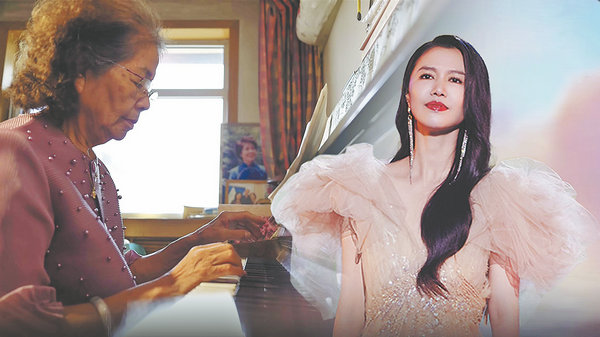Show unearths cultural depth of folk songs
By Xing Wen | China Daily | Updated: 2023-10-26 07:43

Nearly a century ago, Giacomo Puccini's Turandot introduced the world to Chinese folk song Jasmine Flower.
Since then, this music piece, rich with oriental charm, captivating melodies and graceful lyrics, has made appearances at numerous international events.
It transcended cultural barriers, touching the hearts of audiences worldwide and showcasing the beauty of Chinese folk songs.
Recently, China Media Group produced a musical program called Chinese Folk Song Gala, which shows how the music piece, originally hailing from the Jiangnan region — the areas south of the Yangtze River — underwent local adaptations as it spread across different regions of China.
Performers from the Ningxia Hui autonomous region, Hebei, Liaoning, and Fujian provinces have creatively reinterpreted Jasmine Flower, displaying the diverse transformations and regional characteristics of this well-known folk song.
"Through the performances of the singers, we gain an insight into how the song has blossomed in various regions. Some have preserved its original lyrics, while localizing the melody. The majority have retained its tune but infused it with their unique regional styles," analyzes Li Yuehong, a professor with the China Conservatory of Music.
"For example, when we listen to its rendition from Northeast China's Liaoning province, one might instantly sense the influence of elements from Er'renzhuan, a popular form of folk singing and dancing in the region. Similarly, in the case of the Fujian version, the influence of the local dialect is apparent in the pronunciation of the lyrics, instantly transporting us to the region," she adds.
The recently broadcast program, Chinese Folk Song Gala, embarks on a journey to unearth the cultural essence woven into traditional folk songs.
It delves into the historical and contemporary aspects of folk music, showcasing the innovative evolution of China's rich folk song heritage.
The show invited folk singers and enthusiasts from various regions who, through their performances, exemplify the diverse types and regional characteristics of folk songs.
The program also features well-known young artists like Tan Weiwei, Zhou Shen and Huang Ling, who engage in the in-depth learning of folk songs and hone their singing skills on the show.
These professional and amateur singers collaboratively engage in creative reinterpretations of classic folk songs.
"Our intention is to exemplify the innovative development of traditional culture by the younger generation. This year, in addition to presenting authentic folk songs, we place a strong emphasis on creatively reproducing folk songs. Our primary focus is on the fusion of folk songs across different genres, exploring connections between folk songs and traditional Chinese art forms, folk songs and rock music, and the interplay between folk songs and pop music," says the show's director, Hao Jing.
The program has collaborated with academic institutions and national performing arts groups to invite experts and scholars in folk music. These experts form an advisory panel, providing intellectual support for the adaptation of folk songs in the program and offering insights into the cultural significance of these songs.
Wang Yang, deputy director of the Zhejiang Conservatory of Music, notes that folk songs serve as authentic narratives of the lives and vibrant emotions of people from different periods and regions.
"Their distinct appeal stems from their capacity to mirror the geographic landscape, local tradition, social life and some other aspects of the regions where performers come from," he says.
"China boasts a rich and time-honored tradition of folk songs, offering a plethora of styles and stories. Exploring folk songs provides a window into the historical, social and cultural tapestry of China. Simultaneously, delving into the melodies, harmonies and structures of these songs is a crucial pathway toward a deeper comprehension of Chinese music," Wang adds.
In July, the program's production unit initiated a new media video collection campaign titled Singing Folk Songs for My Hometown. To inspire broader public engagement in this online event, more than 20 renowned CMG hosts and reporters including Sa Beining, Zhu Xun, Ren Luyu, Li Jiaming and Ju Ping, recorded videos where they performed folk songs from their respective hometowns. This not only set a positive example for online audiences, but also highlighted the diversity of Chinese folk songs, according to Wang.
























